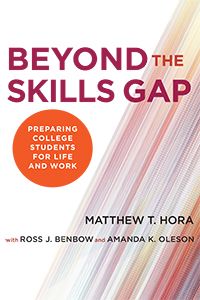Hora on ‘Beyond the Skills Gap” in Insider Higher Ed
October 27, 2016

Beyond the Skills Gap: Preparing College Students for Life and Work by Matthew T. Hora and Ross J. Benbow
From the article:
Q: Many books with “skills gap” in the title tend to advocate that higher ed shift to a vocational orientation. Your book is different. How are you trying to redefine the skills gap?
A: We’re not necessarily attempting to redefine the skills gap idea, but instead choose to reject it altogether in favor of a counternarrative focused on a systemic and teaching-centered approach to dealing with the problems facing today’s college students, the higher education sector and society at large. The notion of a skills gap is problematic because it offers an overly narrow and inaccurate diagnosis of what ails the labor market as well as the role that higher education can and should play in society. It pins the blame for employer challenges with hiring (and sluggish economic growth) solely on higher education, especially the arts and humanities.
While some aspects of the skills gap narrative are true -- occupational shortages do exist in fields like nursing and career pathways could be better articulated for many college students -- many of its other premises are simply wrong. Hiring challenges are often due to low wages, the responsibility of employers to provide training is rarely mentioned, and labor economists point to issues with overly stringent hiring criteria and inadequate demand. If the skills gap were merely an academic debate, that would be one thing, but it is informing policy at the state and national levels, where the narrative of a failed higher education system dovetails with an ideologically driven attempt to reform the sector to operate more like private businesses.
Perhaps the biggest problem with the skills gap rhetoric, which unfortunately has become a bipartisan rallying cry, is that it ignores what our research shows is the central issue at hand when it comes to preparing college graduates for the challenges of the 21st century -- that of teaching and learning. The methods educators (and workplace trainers) use to design and teach their courses -- whether face-to-face or online, or in a certificate or bachelor’s program -- play a significant role in determining whether students and employees develop robust technical expertise, cultivate problem-solving and communication skills, transfer abstract knowledge to real-world situations, and foster a lifelong aptitude for self-directed learning. Thus, we aim to reframe the debate to focus on ensuring that all college students have access to experiential, inquiry-based courses that will not only help them get a job, but also expand their minds and foster a critically thinking, well-educated electorate …. So, many pieces of the puzzle are in place in terms of creating a learning-centered higher education, but what is missing is state support and a systems-oriented vision for change that links each of these areas of expertise and programming, celebrates teachers instead of blames them, and places the vocational, intellectual and civic purposes of education on equal footing.


